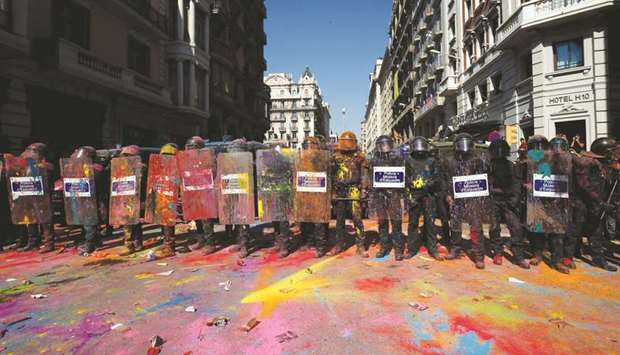Fernando Grande-Marlaska accused the local Catalan police of doing nothing to prevent pro-independence protesters – members of the radical Committees for the Defence of the Republic (CDRs) – blocking the AP-7 toll road, which runs up Spain’s Mediterranean coast, for more than 15 hours on Saturday.
Then on Sunday, the separatist activists forcefully raised the barriers of the highway’s toll booths, letting cars through for free, again without any regional police intervention.
The involvement of national police would be a contentious issue in the northeastern region which has its own administration and where polls suggest almost half the population wants to split away from Spain.
It would also stir memories of Madrid’s decision to send in a large contingent of national police last year after the Catalan government called an illegal independence referendum.
“Serious disruptions of public order and traffic security, such as those seen in the last few days, need to be dealt with by the regional police,” the federal minister wrote to his regional counterpart in an open letter late on Monday.
“If this does not happen ... the government will order an intervention by the state police,” he added.
Catalonia’s government would respond to the questions raised in the letter, spokeswoman Elsa Artadi said yesterday, without saying when or going into further detail.
She repeated calls for dialogue between Madrid and Barcelona.
Spain’s previous conservative government took control of the region when the regional administration unilaterally declared independence following the October 1, 2017 referendum.
Many of the Catalan politicians who took part in the declaration are in prison awaiting trial for rebellion or in exile.
Spain’s new Prime Minister Pedro Sanchez – who came to power in June – has said that he is open to a referendum on greater autonomy and has promised to lay out detailed plans in parliament today.
However, Interior Minister Grande-Marlaska said that the local authorities had to show they could keep order and prevent a repeat of Saturday’s protests.
“It was observed that there was no intervention (by the regional police) ... a reality that is difficult to deny,” he said in a radio interview yesterday morning.
Catalonia along with the Basque Country and Navarra is one of three semi-autonomous regions in Spain that have their own police.
In the other regions, Spain’s national police and Civil Guard force maintain law and order.
But in the wealthy, northeastern region of Catalonia, the Mossos are caught between a rock and a hard place in the independence movement.
The police force was accused of not intervening to prevent the banned independence referendum on October 1, leading to accusations the Mossos chiefs at the time were sympathetic to the separatist cause.
Then last week, Mossos agents charged against CDR activists who were trying to stop a far-right protest.
That led the region’s pro-independence president Quim Torra to call for the heads of current Mossos leaders, siding with the activists and causing more controversy.
But the region’s interior minister Miquel Buch decided against this in a bid to ease tensions within the police force.
By threatening to take control of security in Catalonia, Madrid also wants to ensure a cabinet meeting planned for December 21 in Barcelona will go ahead smoothly, as radical activists promise to disrupt the Mediterranean city with protests.
On the national political scene, Socialist Prime Minister Sanchez is trying to get back on top of things as his right-wing opponents accuse him of being held hostage by the Catalans.
The national parliament in Madrid includes several separatist Catalan lawmakers who helped Sanchez take power in June in a no-confidence vote against then conservative prime minister Mariano Rajoy.
However, earlier this month, the government’s perceived lax attitude towards separatism contributed to the Socialists losing 14 seats in an election in the southern region of Andalusia.
Far-right party Vox and centre-right party Ciudadanos, which have both adopted a hardline against Catalan separatism, scored well in Andalusia.
Calls for Sanchez to be firm towards Catalan pro-independence leaders were further reinforced after Torra on Saturday urged Catalans to follow the example of Slovenia.
The Balkan country unilaterally declared independence from Yugoslavia in 1991, triggering a 10-day armed conflict with the Yugoslav army, in which 62 people were killed.
“The results in Andalusia reinforced the fact that Spanish voters are veering to the right,” said politics professor Oriol Bartomeus.
He added this “and the radicalisation of the situation in Catalonia are creating a scenario in which Sanchez has to make a gesture to show that the government won’t allow a downward radical slide in Catalonia”.
But it’s a tough call for Sanchez.
His minority government is relying on the Catalan lawmakers to pass his 2019 budget in January.
If they do not support it by either voting against or abstaining, his very executive could fall before general elections believed to be planned for the fall of 2019.

